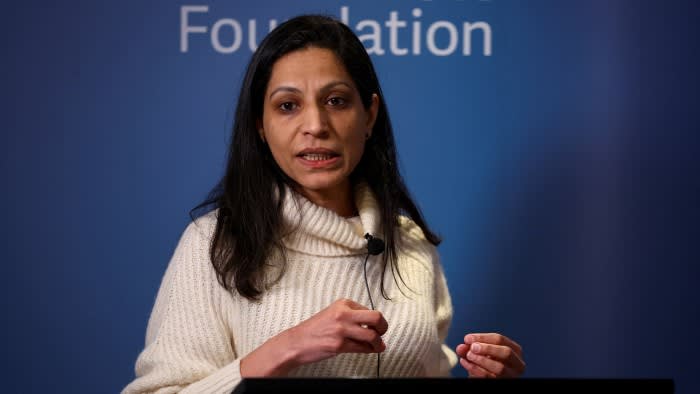Stay informed with free updates
Simply sign up to the UK interest rates myFT Digest — delivered directly to your inbox.
A Bank of England rate setter has warned that the central bank may be “underplaying the downside risks” for the UK economy as she called for immediate interest rate cuts because of weak consumer spending and declining inflation.
Swati Dhingra, an external member of the bank’s Monetary Policy Committee, was the only person to vote for a reduction in interest rates at the latest meeting last week. She advocated a quarter-point cut from 5.25 per cent.
In an interview after the MPC held rates on Thursday, the associate professor of economics at the London School of Economics told the Financial Times she did not see much danger of resurgent price growth given the feeble state of household demand.
“I’m not fully convinced there’s some kind of really sharp excess demand in the economy coming from the consumption side,” she said. “I’m more concerned that we might be underplaying the downside risks.”
With pandemic-era savings diminishing and job vacancies declining, there were fewer “buffers” propping up UK households’ finances, she added.
“You might see the real economy start to get negatively hit in a more profound way — and I don’t see why we should be risking that,” Dhingra said.
Given the weak state of consumption, “it is hard to imagine how that will get reversed so sharply that you will see a resurgence of inflation [driven by] demand pressure”, she added.
Despite keeping rates on hold last week for a fourth meeting, the central bank has now opened the door to cuts but only once there is “more evidence” that inflation will continue to decline.
Headline consumer price inflation was 4 per cent in December, less than half the rate at the start of 2023.
Huw Pill, the bank’s chief economist, said on Monday that it was now a question of when, not if, the BoE lowers rates, but he said the time was not yet appropriate.
Dhingra added that sitting tight would come with a risk of “overtightening” monetary policy as inflation declines.
Her decision to vote for a cut for the first time was triggered in part by the very poor retail sales figures seen in December, which underscored the weakness of household demand.
The quantity of goods bought in Great Britain fell 3.2 per cent between November and December, the largest monthly fall since January 2021, according to the Office for National Statistics.
“The retail sales was pretty convincing . . . I didn’t think they would fall so much,” she said.
While the central bank has been worried by the sticky nature of services price inflation, Dhingra argued that goods price deflation would be potent enough to keep UK inflation at the central bank’s 2 per cent target this year.
The bank predicted last week that inflation will fall towards 2 per cent in the second quarter before rebounding later in 2024.
Dhingra said it was now six months since inflation had firmly shifted downward, with widespread declines by components that make up the consumer prices index.
“It’s been a pretty consistent drop that’s been happening,” she said. “I was fairly convinced that this wasn’t just energy driving everything; this was much more broad-based than we had seen.”
At the same time the economy hasn’t seen a wage-price spiral that would threaten the central bank’s ability to return inflation to target, she added.
Given the lags in the operation of monetary policy, Dhingra said, “even if you cut now . . . we’re basically still looking at a pretty restrictive period of monetary policy”.
